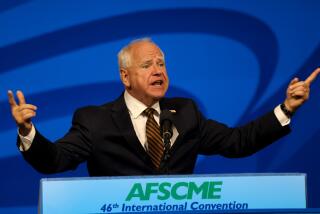Clinton Contributes to Race Debate, but Brown, Thompson Steal Show
Presidents have long since mastered the art of using sports for cheap, positive publicity.
They show up at the ballgame and throw out the first pitch. They call the winning Super Bowl teams in the locker room. They invite championship teams and Olympic athletes (except those naughty hockey players) to the White House for a photo op.
But never before has sports tied in so perfectly with a presidential agenda as it did for Tuesday night’s town hall meeting televised on ESPN.
President Clinton is in his last term, with no higher office to aspire to. His sole purpose right now is the fight for the ultimate spin control: his place in history.
Clinton wants the start of a national dialogue on race to be his legacy, not allegations of financial improprieties or sexual harassment or fooling around with an intern.
If you want to talk about race, the world of sports is the perfect ground. It has been an area that has shown how much people of any color can accomplish when they are allowed to compete on even terms. Sports have provided countless examples of different races working together to achieve a common goal. Yet sports also illuminates the difficulties minorities have in reaching the upper strata of our society, in this case coaching, management and administrative positions.
“America, rightly or wrongly, is a sports-crazy country,” Clinton said. “And we often see games as a metaphor or a symbol of what we are as a people.”
Clinton knows all this because he is an avid huge sports fan himself.
A town hall meeting was a good idea with one problem. Clinton never should have joined a panel with Jim Brown and John Thompson. It’s like acting in a scene with a child or a dog. You don’t stand a chance.
Brown, the former NFL star with no team or boss to answer to, speaks clearly, decisively and is unafraid to challenge his fellow African-Americans. He’s just as likely to say things that white people want to hear as things black people don’t want to hear, but they always hit close to the truth.
As a former Georgetown beat writer, I’ve had my share of disagreements with Thompson. But I’m always interested in what he has to say. His is one of the most informative and provocative voices in sports.
Brown and Thompson stood out over Clinton--and the rest of the panel that included 49er President Carmen Policy, baseball Hall of Famer Joe Morgan, Georgia Athletic Director Vince Dooley, Minnesota Viking Coach Dennis Green, St. John’s basketball player Felipe Lopez (a late addition after complaints about lack of Latino representation), track star Jackie Joyner-Kersee, San Diego Padre owner John Moores and New York Jet wide receiver Keyshawn Johnson, who came off quite well and showed that he has goals beyond simply attracting attention to himself.
Tuesday night, Brown hammered home his ongoing call for African-American athletes to reinvest their money in their own community--i.e., by hiring black agents--and to pool their resources for the empowerment of themselves and the race. He got into it with Joyner-Kersee, who said people should spend their money however they want, and with Thompson, who defended the use of agent David Falk for himself and ex-Georgetown players because he sees Falk as loyal and skilled before he is white.
All Clinton could do after Thompson and Brown finished was say that they both had a point.
Clinton waffled again when a white high school student brought up an explosive point by asking whether minority athletes with lower grade point averages and Scholastic Assessment Test scores should be entitled to scholarships at the expense of white students with higher GPAs and SATs.
Clinton used the case he stated in fighting Proposition 209 in California: “I made the argument that they would give a minority athlete a scholarship under the new system because of his or her athletic ability and have another member of a minority group who had higher grades and higher SAT scores [not get one],” he said. “So it wasn’t just a race issue.”
Clinton went on to some campaign-style rhetoric about how he has increased the amount of scholarship and grant money, then concluded by saying, “My view is, [colleges] ought to be able to recruit athletes, but they ought to give enough scholarships so that every young gifted person who can be admitted to a school should be able to go without regard to the money that they or their families have.”
It took Thompson, who was given a chance to speak after ESPN returned from a commercial break, to say what really had to be said to the people who backed Proposition 209: “I think I need to bring to his attention that the athlete is not the only one that gets special preference. If your folks have a lot of money, you get special preference from the university. If you are the son or daughter of an alumni, you get special preferences. Our society is about special preferences.”
Clinton deserves credit for at least trying to bring racism, America’s most nagging issue, to the forefront. But he shouldn’t take too much.
“I feel better about my country than I did before we started,” he said at the end of the show, “and I think all of you do, don’t you?”
No. I felt much better after the stereotype-busting NCAA tournament in March, when a bunch of strong white players from Utah used their physical abilities to beat teams while their black point guard--at the basketball equivalent of the quarterback position--engineered the whole run to the championship game, and a black coach at Kentucky showed that when African Americans are given the opportunity to take over top programs, they can win titles with them too.
That was progress in action, not in discussion. As Joyner-Kersee said, “We can talk and we can talk, but people need to listen, and people need to do something about it.”
More to Read
Go beyond the scoreboard
Get the latest on L.A.'s teams in the daily Sports Report newsletter.
You may occasionally receive promotional content from the Los Angeles Times.










